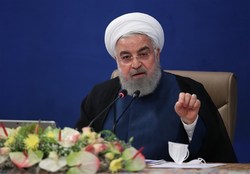 Iranian President Hassan Rouhani called on the remaining parties to the 2015 nuclear deal to safeguard one of the main achievements of the JCPOA by terminating the UN arms embargo on Iran, warning that obedience to the US would deal a severe blow to multilateralism.
Iranian President Hassan Rouhani called on the remaining parties to the 2015 nuclear deal to safeguard one of the main achievements of the JCPOA by terminating the UN arms embargo on Iran, warning that obedience to the US would deal a severe blow to multilateralism. RNA - Speaking at a cabinet session on Wednesday, Rouhani said the Group 4+1 is faced with a test in the coming weeks, which is saving an achievement of the Joint Comprehensive Plan of Action by terminating the arms embargo on Iran.
“The Group 4+1 must realize that today, it is not only a matter of Iran’s interests or Iran’s relations with them or Iran’s relations with regional countries. What matters today is the issue of saving international law, the issue of multilateralism, and the issue of value of international agreements.”
The president also warned the parties to the JCPOA that careless moves and being influenced by the US would deal a major blow to international laws and regulations as well as multilateralism. “This would be to the detriment of all parties.”
He further underlined that nobody could blame Iran, because the Islamic Republic has complied with the international law criteria and international norms.
“The violation (of the JCPOA) committed by the others does not mean that Iran is to blame,” the president said.
Rouhani also emphasized that Iran has not and will not become isolated, contrary to the US objectives.
Iran and the Group 5+1 (Russia, China, the US, Britain, France, and Germany) on July 14, 2015, reached a conclusion over the text of the nuclear deal.
The JCPOA took effect in January 2016 and was supposed to terminate all nuclear-related sanctions against Iran all at once, but its implementation was hampered by the US policies and its eventual withdrawal from the deal.
On May 8, 2018, US President Donald Trump pulled his country out of the nuclear accord.
Following the US withdrawal, Iran and the remaining parties launched talks to save the accord.
However, the EU’s failure to ensure Iran’s economic interests forced Tehran to stop honoring certain commitments under the JCPOA.
Iran has reduced its commitments to the nuclear deal in five steps, but has made it clear that it would immediately return to the JCPOA if the other parties fulfill their commitments.
Tasnim
112/940